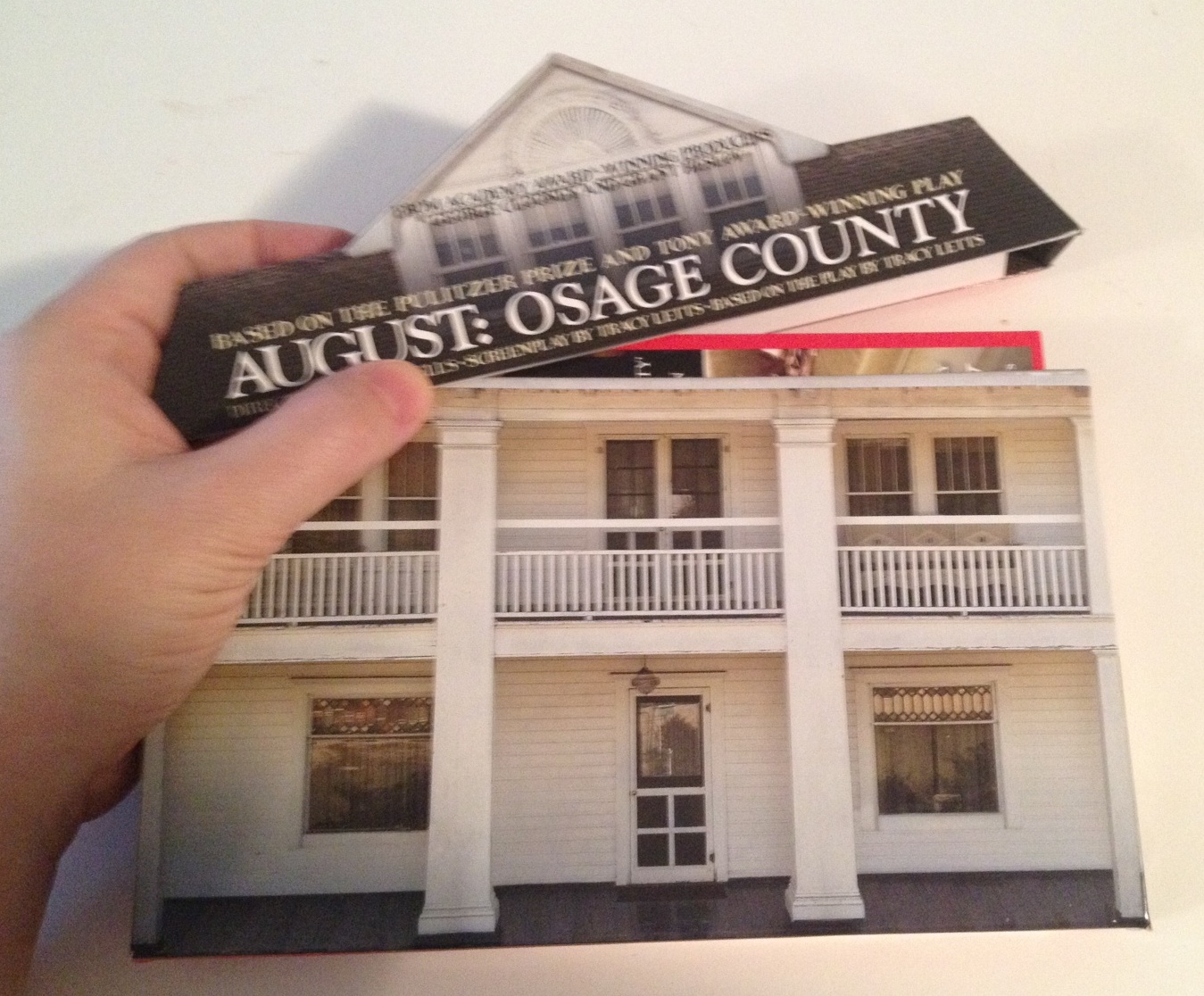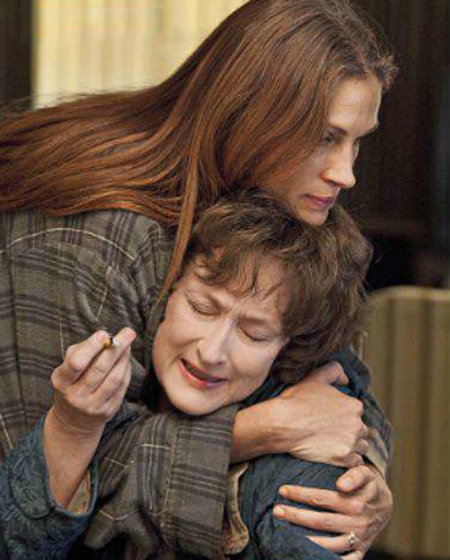 They do right by the first scene at least trimming the interminable opening of the Pulitzer and Tony wi. Beginning with the opening, Nathaniel, really? Do you groan audibly when someone says "That scene was so much better in the play / book / original source material" which is the culture snob's version of "FIRST!" ok you'll need to discuss that effect but awkwwwward... EXT. Weston Family Home, Oklahoma. A car pulls int NO. Violet Weston is a piece of work. But then, so it August: Ohmygod.. this is so not going to work.
They do right by the first scene at least trimming the interminable opening of the Pulitzer and Tony wi. Beginning with the opening, Nathaniel, really? Do you groan audibly when someone says "That scene was so much better in the play / book / original source material" which is the culture snob's version of "FIRST!" ok you'll need to discuss that effect but awkwwwward... EXT. Weston Family Home, Oklahoma. A car pulls int NO. Violet Weston is a piece of work. But then, so it August: Ohmygod.. this is so not going to work.
"Eat your fish, bitch. Eat your fish.
... tempting, but where are you going to go from there if you start with Tracy Letts muscular punchy words and move on to your own dumpier nudgy ones? STOP.
You see where I'm going with this? Each time I've attempted to write about John Wells' adaptation of Tracy Lett's stage masterwork August: Osage County, barring a few brief stabs at some element of my discontent or, more likely, some reaction to its Oscar campaign no review has emerged. Obstacles of time, desire, interest, or awards season fussiness surges up and scatters my thoughts when I sit down to write one.
Take this clever piece of FYC swag, a glorified envelope in the shape of a cardboard house.... [more]
When you open it up, you find the FYC fold out inside. It's the AMPAS equivalent of a "buy our product" brochure! This part of August: Osage County, its Oscar campaign, is easier to process. See, I always knew I would have some trouble seeing the film on its own merits (my problem, not the film's) due to my great love of the stage play, but therein lies the danger of personal baggage. Sometimes you can neatly check your baggage or shove it in the overhead bin but other times you end up buried in it, uncomfortable for the rest of your journey.
In my "worst of 2013 " piece I mentioned the release date of August as a particular thorn in my side:
August: Osage County... still not open. And promoted and teased in such a way that I fear one can't discuss it and that it can't even exist without the context of its Oscar campaign. Will the movie magically dematerialize on March 3rd when the Academy closes up shop for the season?
I was joking but the truth of it hit me like a ton of bricks, or at least fell on me like a cardboard house. Whenever I think of August: Osage County I think of it in terms of the Oscars.
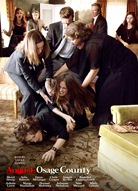 This happens less often than you'd think given the Oscar punditry I'm known for. Usually it's easy to separate films from campaigns but in this case the hunt and lust for Oscar, either real or imagined, seems to make a corpse of the actual work and the campaign becomes its restless ghost. It's not so much that AOC is a film made expressly to compete for Oscars, hardly a new or rare sin, but that the film has had no oxygen outside of that stifling quest... debuts at festivals and multiple academy screenings and no regular theatrical screenings until literally the first day of Oscar voting. Coincidence?
This happens less often than you'd think given the Oscar punditry I'm known for. Usually it's easy to separate films from campaigns but in this case the hunt and lust for Oscar, either real or imagined, seems to make a corpse of the actual work and the campaign becomes its restless ghost. It's not so much that AOC is a film made expressly to compete for Oscars, hardly a new or rare sin, but that the film has had no oxygen outside of that stifling quest... debuts at festivals and multiple academy screenings and no regular theatrical screenings until literally the first day of Oscar voting. Coincidence?
When the stage play premiered it was a certain Tony threat but the conversation was less about future awardage than about Tracy Letts' writing and the incendiary, funny performances. Point me to one review or article or conversation about August: The Movie that DOESN'T mention the Oscars. It's the golden filter through which this film is contextually and continually seen. This happens to other films of course. 12 Years a Slave, for example, premiered at Toronto and instantly had a "Best Picture" banner foisted upon it. But the movie was strong enough to break from the awards ghetto and prompt other conversations, too: discourse about American history, depictions of slavery in cinema, racial politics in movies, school curriculums and such. Many of those conversations have had lots of room to breathe outside of the presumed Oscar competition.
Oscar has become the only context for August, so shall we live-blog this FYC brochure in place of a traditional review? Hopefully that still brings us to opinion and the movie.
cover image
I love the film's rather brilliant and thankfully unusual poster, which shows a fight between Barbara (Julia Roberts, protagonist) and Violet (Meryl Streep, basically the antagonist) with nearly the whole cast in view. This is more people in one image than John Wells the director is adept enough to generally cram in, so it feels exciting. If you don't know the image within context, you can almost mistake it for a dogpile on Meryl Streep, perpetual Oscar queen. GET HER!
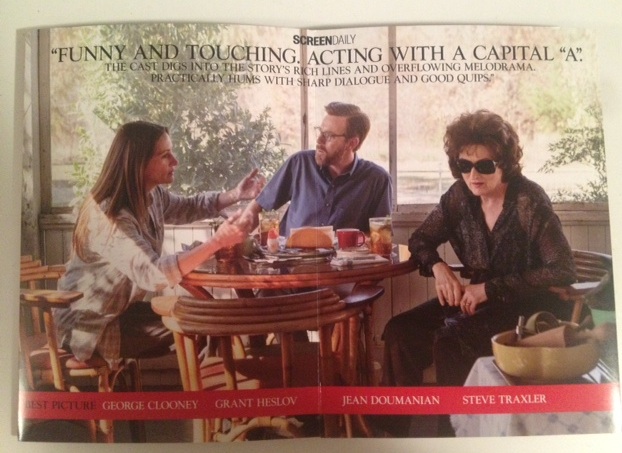
foldout 1
"Acting with a capital "A", goes the quote from Screen Daily which ends with "...practically hums with sharp dialogue and good quips" ...and all of that is totally true. Tracy Letts's dialogue is to die for and the movie leaves much of it alone, intact from the stage, which is a good idea. But "Acting with a capital "A" also makes you a target for vicious slapdowns like the one A.O. Scott gave the movie, deeming it a "thespian cage match" You'd think Thespian Cage Match would be a compliment but with A.O. notsomuch. I'd like to say this about Streep's performance: I love that she has the confidence to act entire scenes with her eyes completely covered from view in those huge black sunglasses. She's such a strong performer -- I've never understood the complaint that she acts from the neck up because her whole body is into it -- that you don't even need the eyes, which are usually a movie actor's chief tool.
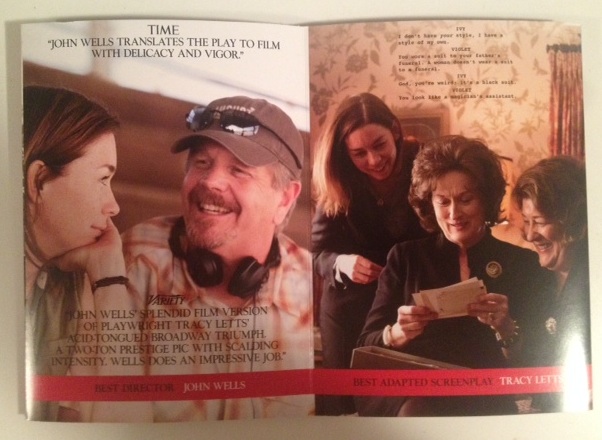
foldout 2
This one is split between an add for Best Director and Best Adapted Screenplay and here is where I start to bristle. I don't know who reviewed the picture for Variety from which the quote is pulled but they claim that John Wells directed it with "delicacy and vigor" and did an "impressive job". If by delicacy and vigor you mean "timidity and mediocrity", sure.
As for the screenplay, this one is far more successful than its recent siblings like Doubt and Carnage, both of which were dramatic and comic powerhouses on stage but weirdly hammy and flat, respectively, onscreen. August is neither of those things in execution but it's no unqualified success either. But, since so much of the play is intact, it still "plays" as it were as a film. It also avoids that typical movie problem of desperate attempts to "open" it. Though there are outdoor scenes in the film version, they never feel like they spring from a wish to pretend that it didn't come from a play.
That said I hated August's already controversial new ending, despite it being well acted by Julia Roberts. It ends August on a much different cathartic release note and though you should adapt and tweak when you're moving from one medium to another, you really shouldn't alter the things about a property that can't be improved upon. [SPOILER ALERT] The play ends with Violet tottering around her house realizing she's been completely abandoned by the family she's been driving away one by one for the entire play. Structurally it's like crowded tight circle with Violet as its explosive center, eventually expelling them all. But you stay with the infuriating mean center. The entire story builds up to and earns that original ending emotionally -- even though, yes, it's bitterly sad after all the caustic comedy. The film hedges, leaving Violet's ending vaguely intact if defanged and drives away with Barbara. This kills the crucial drama of sudden earned emptiness... because WE aren't abandoned at all. We get to escape with a companion (Barbara). Hollywood tends to be afraid of sad endings but the play's enormous success is enough proof that audiences don't mind a little extra twist of the knife in a dark comedy if they've loved all the previous stabbings. [/SPOILER]
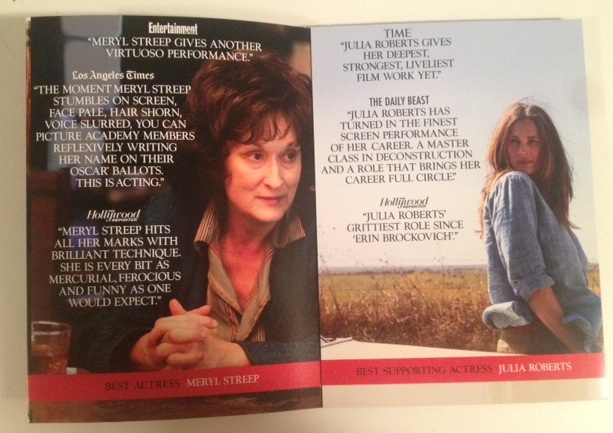
foldout 3
Splits the page between Meryl (Best Actress) and Julia (Best Actress... but there's a typo calling her "Supporting". Huh? That's odd) . The quotes are the usual effusive praise, particularly with Julia who gets a couple of "best work ever" notices. It pisses me right off that the Time and The Daily Beast have hired critics that have never seen Erin Brockovich (2000) to write about the movies! Meanwhile the LA Times blurb for Meryl made me giggle because you can read it as bitchy snark just as easily as you can read it as a rave. It's all in the tone of your voice. Try it. Read it out loud to yourself right now.
The moment Meryl Streep stumbles on screen, face pale, hair shorn, voice slurred, you can picture Academy members reflexively writing her name on their Oscar ballots. This is acting."
"This is acting." That is factually correct, blurb whore, good job.
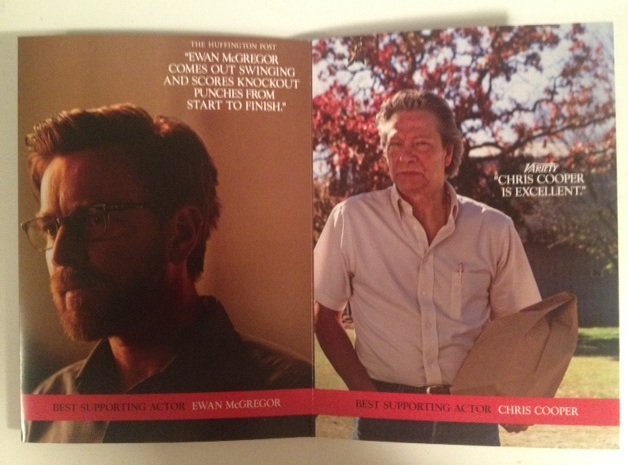
foldout 4
Best Supporting Actor ads for Ewan McGregor & Chris Cooper. The Huffington Post says Ewan "comes out swinging and scores knockout punches from start to finish" so they must have seen a different cut of the film with Ewan playing a different role. Mr. Barbara (I forget his name) has never been that great of a role. I am a huge McGregor nut and I like his body of work but this one is not a big swinging deal. Chris Cooper gets a simpler "...is excellent" which is true; also stingy. He's so good as Uncle Charles that I suddenly remembered how exciting he was back in the days of Adaptation (2002) before his face became burdened with ubiquity.
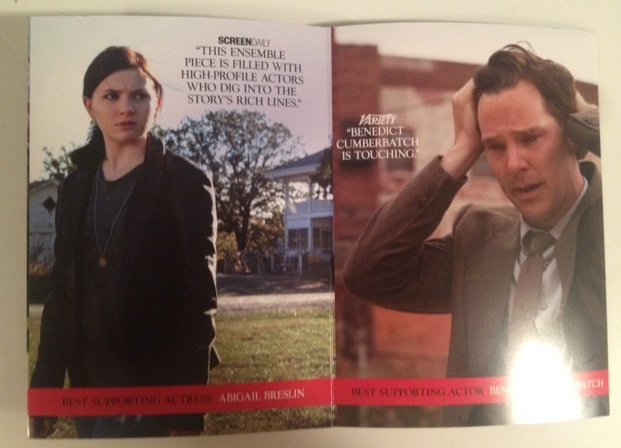
foldout 5
We see Abigal Breslin and her Sullen Teen Eyeliner and Benedict Cumberbatch. Variety says "Benedict Cumberbatch is touching" and I want to add "..his hair." Neither of these performances really did anything for me. Not bad, not good, just there.
fake out ending
The pamphlet abruptly ends with a list of all the eligible Oscar nominations they would like to receive which, if you'd like me to count (yes I know you would) totals 23, or 9 more than Titanic and All About Eve, the current most nominated films of all time. AOC would like nominations in all the standard categories plus 5 Best Supporting Actors (A WHOLE LINEUP) and 5 Best Supporting Actresses (A WHOLE LINEUP).
POP QUIZ/COMMENT SURVEY
Have you ever seen a movie you'd be comfortable hogging the entire supporting lineup in either category in its year?
They are actually campaigning 6 women for Best Supporting Actress. Had they campaigned Julia correctly in Best Actress they would technically be eligible for 24 nominations. It is at this point reading that I am horrifed and angry on Margot Martindale's behalf that not only is Julia stealing her nomination -- I love Margo in this movie as Mattie Fae-- but she didn't even get her own foldout. A third of a second later the truth comes out: the brochure is double sided. We're only half done.
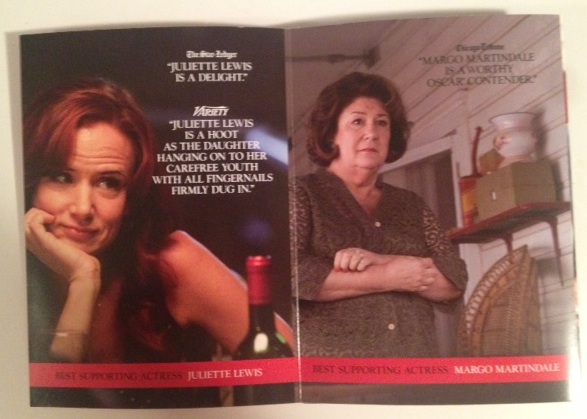
foldout 6
Juliette Lewis and Margo Martindale get their page now. Margo gets the dullest quote this side of Chris Coopers "...is a worthy Oscar contender" That's it? No fabulous turns of phrases? Juliette gets a fun quote from Variety "...a hoot as the daughter hanging on to her carefree youth with all fingernails firmly dug in."
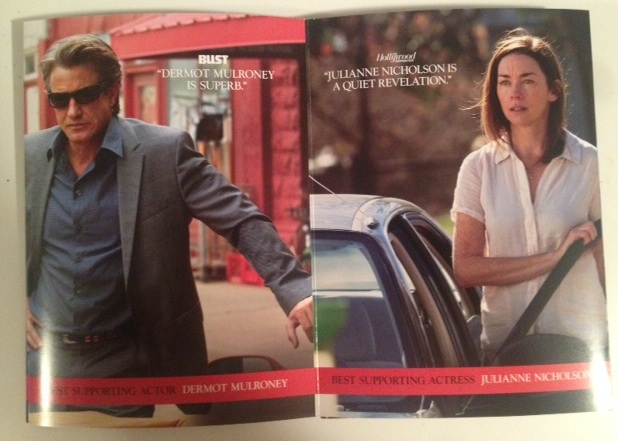
foldout 7
This one is shared by Dermot Mulroney and Julianne Nicholson who get a "superb" and a "quiet revelation" respectively. I can't speak to the "superb" (were they paying madlibs?) but I used to crush hard on Dermot in the 90s so I have no animosity for him and it's cute that he and his My Best Friend's Wedding are onscreen together again, albeit not interacting much. The casting of this film is so strange. Not strange as in unusual but strange as in very late 1990s, right? I digress. Julianne Nicholson has been banging around TV and movies for so long with so little reward that I'm altogether happy for her that she is in two high profile projects simultaneously. But she's much more of a 'quiet revelation' in the other: Masters of Sex.

foldout 8
Sam Shepard and Misty Upham finish out the cast list with the tiniest parts of Beverly (the family's father) and Johnna (the family's maid/cook). Shepard vanishes after his opening monologue since it's hard to reappear in a movie after your character's suicide. This is not so much a spoiler as a plot kick off. The smartest move Letts made in the screenplay adaptation was to convert Beverly's very lengthy opening act monologue into a brief job description conversation with the hired help.
Misty is the only actor who doesn't get her own personalized blurb. She gets a "the movie's acting is uniformly superb" which would be a so much funnier as a swipe if the word "uniformly" wasn't there. I personally don't know why Misty Upham is in this movie. But then the character of Johnna has always felt a bit like the play's only real trouble spot because her role is either too obvious or too underdeveloped. The shorter time frame of the movie and its new ending only further deemphasizes her.
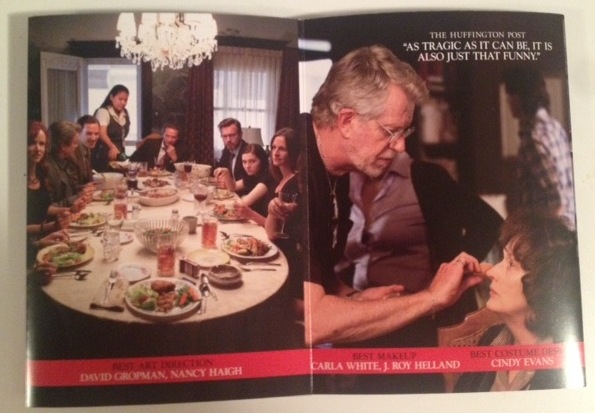
foldout 9
Pushes the art direction with a shot of the Weston family at dinner, presumably all staring at Violet (who would be seated where the camera is) and makeup with a shot of Meryl getting a powder from the makeup team (Carla White and J Roy Helland). You may recall that Meryl thanked this same hair and makeup man profusely during her Oscar win for The Iron Lady.
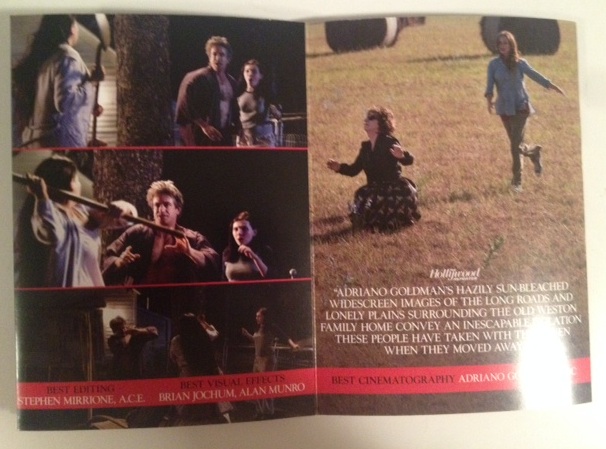
foldout 10
Asks that you consider the editing (I'd rather not!) and cinematography (why not, convince me!). The editing by Oscar winner Stephen Mirrione is one of the film's weaker elements. It's possible that the shots just weren't there to work with but there is so much cross cutting that kills potentially subtle and exciting bits of performance and the crucial "I'm running things now" fight (the one on the poster) is badly botched with mismatched cuts. You lose the thread of what's happening and it's actually even hard to follow what Barbra is doing or shouting. Pity because it's the most electric moment in the source material.
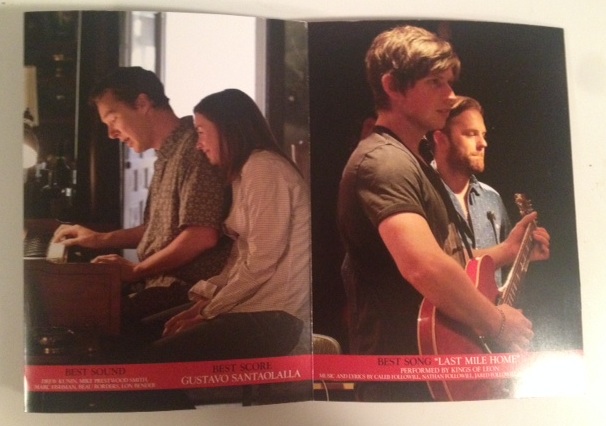
foldout 11
Sound and Score and Song are the last things they'd like us to consider. The piano scene with Little Charlie and Ivy is kind of a lovely oasis in the midst of the movie's plentiful noisy moments of family feuding. I don't remember it from the stage play but the stage play was so long ago and so very long (an hour longer than the movie!) that it's possible it was in there. If it wasn't, why aren't they pushing that as "Best Original Song" instead of that Kings of Leon song which is kind of jarring. Taking a cue from the movie's release strategy, it seems to only exist in order to win an Oscar nomination.

If you don't still know my feelings about the movie after reading this live blog of its Oscar campaign brochure, you surely know my feelings about the Oscar campaign brochure and, as previously posited... are they not the same thing?
Grade?
Oh the complex matter of grading. Let's go like so: The Stage Play: A+; Dreams for the Movie: A; Fears for the Movie: D; The Acting: The gamut from A through C+... but enough about Juliette Lewis! Let's say it's mostly B+ across the board with Streep, Cooper and Martindale getting friendliest with the A; The Direction: D+ (no personality, no inspiration, gets in the way with the rote shot/reverse shot camera language); The Casting: C; The New Beginning: A-; The New Ending: C-; The Screenplay: A-/B+; That scene where the camera goes all drug addled sloppy wild dizzy as if mimicking Violet's own disorientingly wobbly breakdown: F (Jesus Mr Wells, Meryl Streep is ACTING that. You don't have to help her -- she's better than you. It's as silly as those damn amateur-hour canted angles in Doubt; Meryl's Love of Starring in Stage Adaptation of Great Plays For Journeyman Directors When A Real Auteur Might've Made an Actual Classic: D; That brief moment (not in the play) where Meryl runs through the Oklahoman landscape with a pathetic 'hasn't run or exercized in years' limp-armed clumsiness: A; "Eat your fish, bitch": A-; The movie itself: B-
